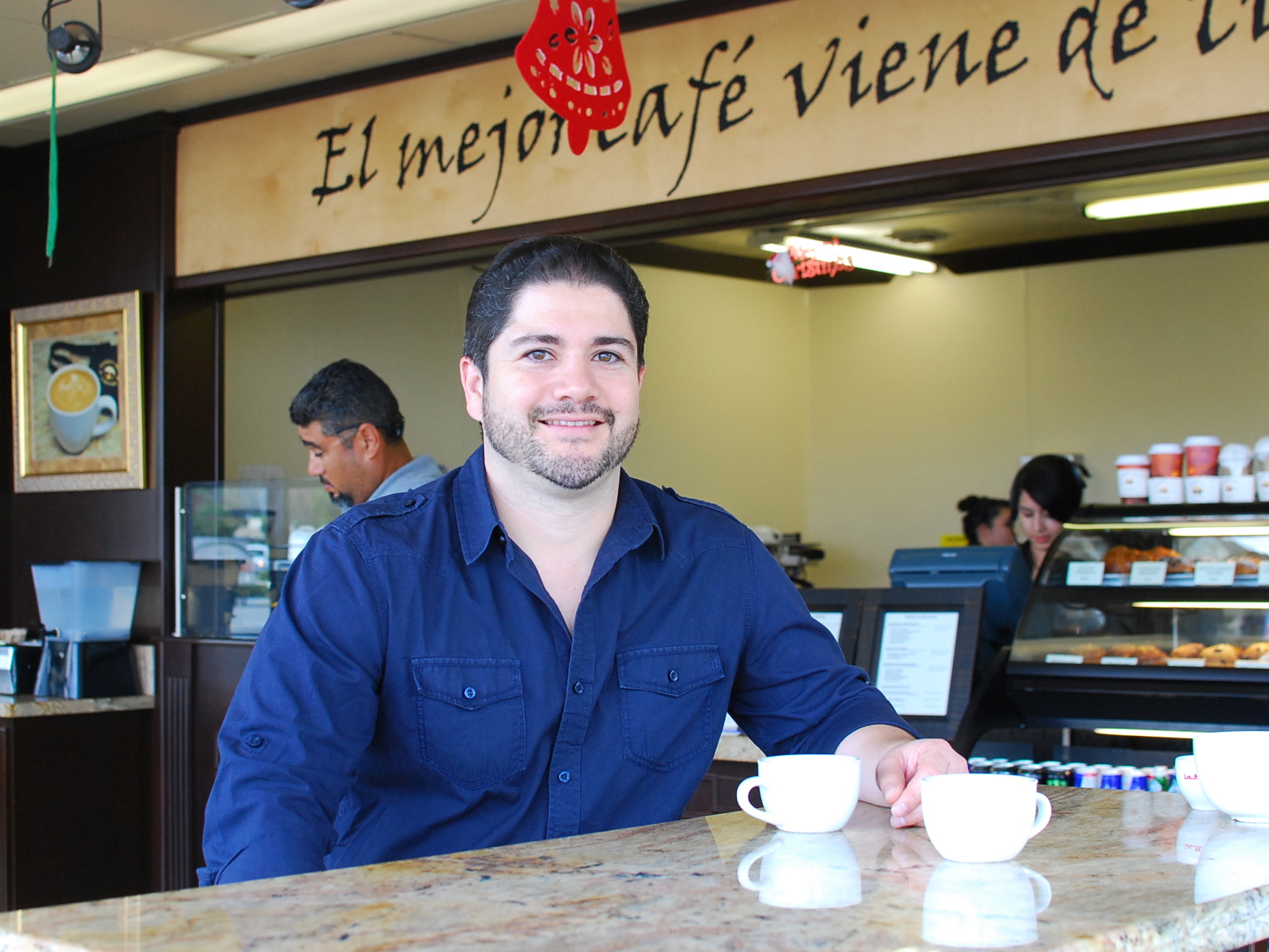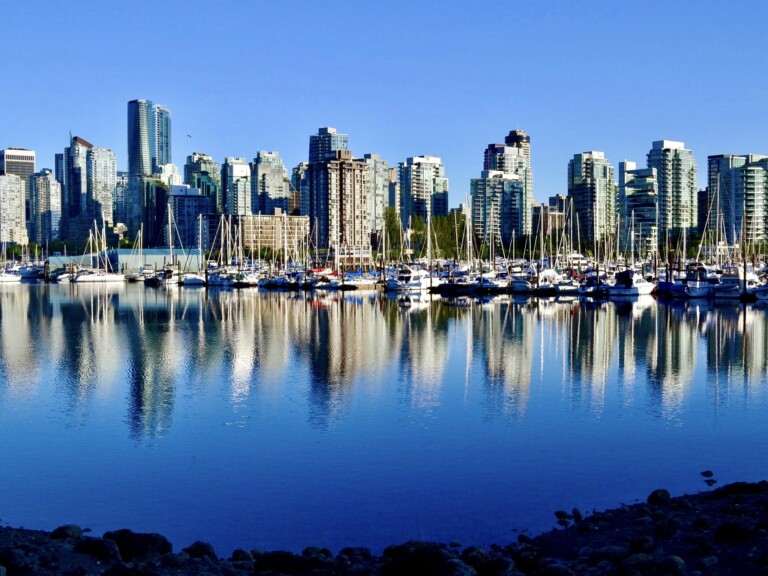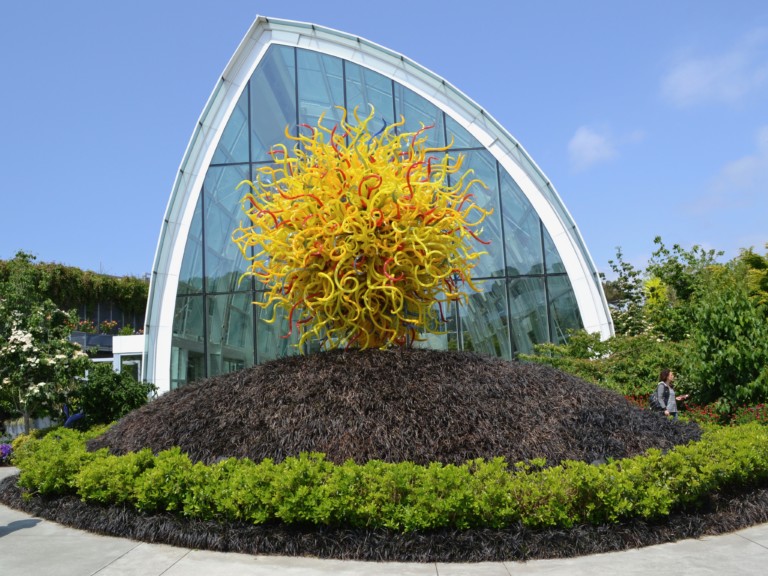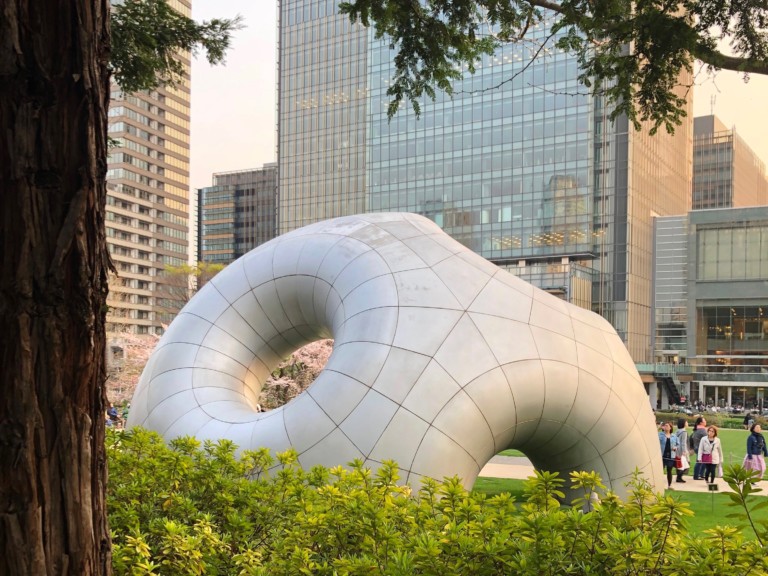INTERVIEW CONTINUED FROM PREVIOUS PAGE
Ulysses Romero founded Tierra Mia Coffee in 2008 after earning an MBA from Stanford University, working as a New York financial consultant and contributing to L.A.’s non-profit sector. He now has five Latin-inflected coffeehouses, primarily in South Los Angeles, roasts coffee on a Probat named Sophia, and tasks a Hobart mixer named RoboCop with producing pastries daily. Romero recently found an apartment in Oakland and is planning Bay Area expansion. We spoke on December 1, and he shared his caffeinated inspiration.
What’s your favorite aspect of owning and operating a coffee company?
As I wake up these days and in the last couple months, one is that we sell an amazing, fun, cool exciting product with a lot of intrigue and mystery, and a lot of history as well. I like what we make, and that makes my job fun, the simple fact that we produce something I enjoy. As we’re growing now and the business gets bigger, to me, from a personal standpoint, what really excites and fills me with satisfaction is the jobs we’re creating in the communities where we’re opening our stores. The fact that we have 78 employees now – some of them are part-time, some of them are students – but we also have full-time, so they’re helping to support their families now, and we’re making a really big impact in the communities. We’ve created jobs and are helping to improve the local economy. The fact that we’re opening a nice place in a city that doesn’t have a nice place is good for people, it’s good for the local community, it’s good for property values that we’re developing in a city. So from a personal standpoint, the job creation component is very important to me. That drives me in a lot of ways, less than money. Knowing that we’re doing something positive gives me a good sense of satisfaction. It kind of goes back – I mentioned earlier that I worked in business consulting and was on Wall Street for awhile, and then I worked at United Way in L.A. in the non-profit world – so I’ve always felt like it’s important to have a job you like and make money. To me, it’s also important to give back and to do something positive and now we’re able to do that. At some point, I’m also thinking about creating a non-profit component to our business as well. That’s definitely on my list, but I’ve just been so busy with the stores, and right now the biggest impact we can make is job creation, especially in a down economy.
What’s the biggest challenge, especially now that you’re expanding and considering expanding to the Bay Area?
My task is the transition of being the manager and owner of one or two coffee shops, to actually creating an organization. We have to build a team now, to actually accomplish everything we want to be able to accomplish at the same level of quality we’ve been doing. I have to be able to set up managers at each store, someone in each store to make sure we’re executing on a really good product, with really good service. There’s that component. Then our roasting business and our bakery business, they really are their own entities now and their own separate businesses with their own set of problems and their own equipment, staffing, and sourcing…I have to have people that can drive or manage and make each of those businesses successful. Now it’s about creating that structure and bringing up people. We’ve been able to home grow folks within the company, but the next step will probably be to hire someone who handles new store development, since that’s more of my focus…I’ve been handling new store development and construction, but I really need to manage all components of the business. That’s going to be the next step, and slowly build our back office function as well, which I’ve also been handling.
Is wholesale a part of your plans?
It’s not right now. Part of it is just that I feel my energy’s better spent on the retail side. That’s really more of my focus, because every time we open a store, we’re our own best customer, and I don’t feel I have to convince my store to sell a Mexico C.O.E. That allows us to get the best coffee. I like that aspect. I also feel that the wholesale business requires a lot of management. One is just selling. Ultimately you have to have people that want to buy your product. Then you have to make sure the wholesale account is executing on your coffee in the right way. That’s a lot of work. Not that we won’t – possibly – do it in the future, but right now it’s not in my plans. Right now it’s to focus on our own internal operations, our roasting, our baking and our in-store experience. At some point maybe we can hire somebody to do it, but at this point, we probably would have to have a bigger facility as well. Maybe when we get a bigger facility – that’s probably two years out – maybe at that point we’ll look at it again.
What will it take for you to consider Tierra Mia a success as a company?
In some ways I feel like we already are successful. My initial goal, at least when I started the business, was to get at least three retail locations that are successful and operating. And if I reached that, then I achieved what I initially set out to do? Now it’s really to be the best we can be from a coffee standpoint. I would like for us to be one of the leading artisan coffee concepts in the country. That’s my goal right now. With that in mind, I will continue to try and grow our company in particular with retail stores. I feel like we can do the things there that we want, have people try our product, learn about us, create a stronger brand, and then also create more jobs. That’s for me the plan at this point. I don’t really have a number that I’m sticking to. It’s really let’s grow as much as we can. At this point, I had a group of investors that came into the business when this first started. We could grow a lot faster if we went out and raised more capital. Our approach right, which is to grow organically, and with the current ownership structure, we can continue the strategy that we have, which is to offer the best quality. If you bring in outside capital, you really have to have a partner that is committed to it. You don’t know if things will go bad. I have been approached by folks that want to grow the business, that want to open 50 stores in thee to five years. I kind of feel like we can probably do it anyways, ourselves. We can do it in a way that is true to form and with a real commitment to quality.
Will the Bay Area locations also be focused on Latino customers?
I’m negotiating a space right now that’s not. From a business standpoint, it’s less risk for us because we already know e have a proven concept in that demographic, but I always felt we could go into any demographic, because we focus on quality coffee. Everybody wants good quality coffee, and most cities are still underserved as it relates to quality coffee. I kind of feel like we can go anywhere, but it does seem less risky for us because of the connection that we have with folks who are in a Hispanic neighborhood, with us being a Latin coffee concept. Right now, it will be both. Really it’s more about finding a good location that will work for us where I think we can be financially successful.
Is the Bay Area because that’s where you went to school? Why there for your next step?
Some people say, “Why don’t you go to Orange County or San Diego, where it’s closer?” I feel like the Bay Area is a good coffee drinking area, where people appreciate coffee and quality coffee. Consumption there is a little bit higher per household, probably – without having any data – so I felt like it’s a good market in general. I also feel that it will really help us continuing to build our brand, having a presence in Northern California and Southern California. That will strengthen the company with additional locations and openings. And I think it’s just exciting and fun to go to a new geography and new market, to try something new, to take a little bit of risk. Who knows. Maybe we’ll be more successful up there than we are here in L.A. And then the other part is I do have connections to the Bay Area, understand the area, went to school there, my Bachelor’s and my Master’s. I have a lot of friends there. It’s fun to go there. I’m not married. I don’t have kids. I can kind of go back and forth. From a personal standpoint, it makes a lot of sense too.
You can foresee locations in Berkeley and Palo Alto?
Sure. Oh yeah. My idea is to actually do what we’re doing here, which is to go into under-served markets. We’ve proven you can be successful in areas where we’ve been going into. I like Oakland a lot. I’ve been thinking about that being our starting point in the Bay Area. San Francisco would be great, obviously. And then moving down the East Bay, so San Leandro, Heyward, those are cities I think we could be successful in, and then obviously San Jose. Hopefully we can get going and it works and then maybe we can open additional ones in the Bay Area as well.
Now you can begin to see why I need a person to handle expansion.
Maybe more than one.
Sure. We’ll start with one.
What’s a typical coffee consumption day for you?
Now that we have the downtown store, I have a store right below my place. I actually live in the same building. I typically always have black coffee. I’ll rotate with whatever we have on bar. Some of it is out of personal enjoyment. The other is quality control, so any time, every day, I’m doing quality control. But I’m also tasting, tasting, tasting. I never finish anything. So I’m tasting, tasting, then it will get cold. Now I’ll prep something else. Typically I’ll have our brewed coffees. I’ll also have espresso, sometimes a latte, sometimes a capp. That’s typically what I’ll have.
All in the morning or throughout the day?
Throughout the day. Lately I’ve been working out of my place, kind of a home office, so I’ll take something up with me. Sometimes I’ll have an espresso and brewed coffee. Sometimes I’ll just have a latte, and a couple hours later I’ll have something else. Then I’ll have lunch. After lunch, I’ll have something else.
If you could only drink one more shot of espresso, and you couldn’t pull it yourself, who would pull it for you?
José Rodriguez, our Roast Master. He’s really passionate about coffee. He tells me that one thing that excites him about what he does is the end result, what our customers are tasting, the fact that somebody’s walking away having tasted something they’re going to enjoy. He sees it when he’s roasting. It would be roasted by him and pulled by him, and I know it’s something he would put a lot of attention to.









Blog Comments
Weeks After Selling, L.A.'s 'Domestead' House Pops Back Up for Sale - Coldfax Business News and Analysis
April 11, 2024 at 7:50 PM
[…] deciding to flip it back onto the market. The ask is $2.3 million, which is $300,000 more than the Tierra Mia Coffee founder paid for the aptly named “Domestead” house, tucked away in L.A.’s Glassell Park neighborhood, […]
Guadalupe
August 22, 2023 at 6:53 PM
Hola estoy interesada en poner un local de tierra mía en los ángeles me podría dar información por favor
Gustavo Alvarado
June 5, 2020 at 1:46 PM
Me podrían dar información cuanto sale la franquiyde Tierra mia me gustaría abrir un local en La cuide La Puente Ca y cuanto nesecitaria para invertir
Susan Chavez
March 23, 2020 at 9:01 PM
Tonight your store in Montebello modeled complete non-compliance with the orders of Our governor and mayor asking for social distancing and the 6 foot rule. It was packed with one foot or less between persons. I have photo to share. It seems to me there is a lack of compliance and or understanding. Please show more concern for our community.
Araceli Mascorro
August 1, 2019 at 11:15 PM
[email protected]
Me and my family love Tierra Mia we are hoping you could open on in Hesperia CA or Victorville
Kathy Crabb
August 3, 2014 at 9:09 PM
My husband goes to Tierra Mia almost every weekday! He works near the Pico Rivera location one. We live in Orange County and are hoping you open one down here soon! We can’t find anything like it down here:( please, please ….there are sooo many coffee drinkers of all nationalities that would LOVE your coffee!